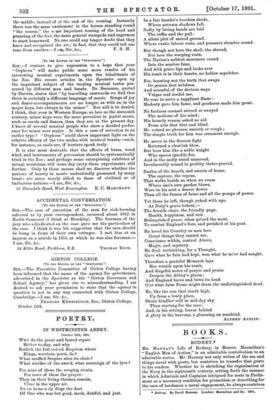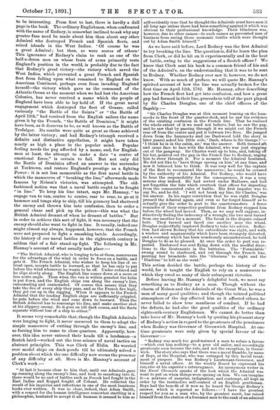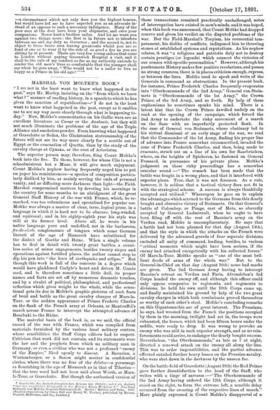BOOKS.
RODNEY.*
MR. HANNAY'S Life of Rodney, in Messrs. Macmillan's. "English Men of Action," is an admirable contribution to an. admirable series. Mr. Hannay not only writes of the sea and things naval with gusto, but contrives to transfer that gusto to his readers. Whether he is sketching the organisation of the Navy in the eighteenth century, setting forth the manner in which Admirals and Captains intrigued for seats in Parlia- ment as a necessary condition for promotion, or describing for the ears of landsmen a naval engagement, he always contrives • Rodney. By David Hannay. London: Macmillan and Co. 1891.
to be interesting. From first to last, there is hardly a dull page in the book. The ordinary Englishman, when confronted with the name of Rodney, is somewhat inclined to ask why any greater fuss need be made about him than about any other Admiral who destroyed French and Spanish fleets, and seized islands in the West Indies. Of course he was a great Admiral ; but then, so were scores of others.' This ignorance of Rodney's claim to rank as one of the half-a-dozen men on whose feats of arms primarily rests England's position in the world, is probably due to the fact that Rodney's great victory—the victory which saved the West Indies, which prevented a great French and Spanish fleet from falling upon what remained to England on the American Continent, perhaps even from invading England herself—the victory which gave us the command of the Atlantic Ocean at the moment when we had lost the American Colonies, has never received a name which the people of England have been able to lay hold of. If the great naval engagement which destroyed the fleet of Grasse, called variously "the Battle of the Saints" or "the Battle of April 12th," had received from the English sailors the name given it by the French, " the Battle of Dominica," it might have been, as it deserves to be, as well known as the Battle of Trafalgar. Its results were quite as great as those achieved by the latter victory ; and had Rodney's triumph received a definite and distinctive appellation, it might have taken
nearly as high a place in the popular mind. Popular feeling needs the peg afforded by a name, and, for English- men at least, the attempt to make a date " a centre of emotional force," is certain to fail. But not only did the Battle of Dominica afford an answer to the surrender
at Yorktown, and restore England's prestige as a fighting Power : it is not less memorable as the first naval battle in which the manoeuvre of " breaking the line," afterwards made famous by Nelson's victories, was attempted. The old- fashioned notion was that a naval battle ought to be fought " in line." To keep his line intact, says Mr. Hannay, " to engage van to van, centre to centre, rear to rear, to go at it hammer and tongs ship to ship, till his gunnery bad shattered the enemy and thrown him into confusion, then to order a general chase and pick up the prizes—this was what the British Admiral dreamt of when he dreamt of battles." But in order to achieve this sort of fight, it was necessary that the enemy should also want to fight in line. It usually, indeed one might almost say always, happened, however, that the French were not prepared to fight a smashing battle. Accordingly, the history of our naval battles in the eighteenth century is seldom that of a fair stand-up fight. The following is Mr. Hannay's account of what usually took place :-
" The British Admiral, who is longing to be at them, manoeuvres for the advantage of the wind in order to force on a battle, and gets it. The French Admiral, who wishes to keep his line of re- treat open, accepts battle to leeward, so that he has only to put before the wind whenever he wants to be off. Under reduced sail he slips slowly along. The English line comes down at a more or less acute angle. Then when the van is within gunshot the helm is put down, and the English ships run along the enemy's line, cannonading and cannonaded. Of course this means that they take the fire of every ship they pass, and as the French fire high, they get cut up in the rigging. When it appears to the French Admiral that the leading English ships are sufficiently crippled, he puts before the wind and runs down to leeward. Then the British Admiral has to rearrange his line, and make another shot at his slippery enemy. So it goes on till dark comes, and the fleets separate without loss of a ship to either."
It seems very remarkable that, though the English Admirals were longing to fight, it never occurred to them to adopt the simple manceuvre of cutting through the enemy's line, and so forcing him to come to close quarters. Apparently, how- ever, this idea never entered their heads till a landsman—a Scotch laird—worked out the true science of naval tactics on abstract principles. This was Clerk of Eldin. He worried
over model ships on duck-ponds till he ultimately solved a problem about which the one difficulty now seems the presence of any difficulty at all. Here is Mr. Hannay's account of Clerk's work :- " At last it became clear to him that, until our Admirals gave up running along the enemy's line, and took to smashing into it, there would be no end of battles such as Pocock had fought in the East Indies and Keppel fought off Ushant. He collected the result of his inquiries and reflections in one of the most luminous books ever written. It was so clear, indeed, that Adam Smith, with a respect for the human intelligence somewhat startling in a philosopher, hesitated to accept it all because it seemed to him so self-evidently true that he thought the Admirals must have seen it all long ago unless there had been something against it which was obvious to their professional knowledge. Their blindness was, however, due to other causes—to such causes as prevented men of business from seeing those economic truths which were thought out by Adam Smith himself."
As we have said before, Lord Rodney was the first Admiral to try breaking the line. The question is, did he learn the plan from Clerk, or did he hit on it experimentally and in the heat of battle, owing to the suggestions of a Scotch officer P We know that Clerk sent his book to a common friend of his and of the Admiral's, on the understanding that it was to be sent to Rodney. Whether Rodney ever saw it, however, we do not know. With so much of preface, we will quote Mr. Hannay's spirited account of how the line was actually broken for the first time on April 12th, 1782. Mr. Hannay, after describing how the French fleet had got into confusion, and how a great gap had formed in their line, proceeds to tell of the part played by Sir Charles Douglas, one of the chief officers of the flagship :-
" Sir Charles Douglas was at this moment leaning on the ham- mocks in the front of the quarter-deck, and he saw the evidence of the existing confusion in the French line. That he realised the whole extent of it we need not believe, but he saw the gap, and he saw that by passing through it we might cut the French rear off from the centre and put it between two fires. He jumped down from the hammocks and (so Dashwood told the story in later years) asked his little aide, ' Dash, where is Sir George ?'— ' I think he is in the cabin, sir,' was the answer. Both turned aft and came face to face with the Admiral, who was just stepping- out of the gangway. Sir Charles went up to him, and, taking off his hat, pointed out the gap in the French line to Rodney, urging him to steer through it. For a moment the Admiral hesitate& He did not like to have things sprung on him' at any time, and now it behoved him to think. It was very well for the captain of the fleet to recommend the manoeuvre ; he would be covered by the authority of his Admiral. For Rodney, who would have to bear the responsibility for the consequences, it was a very serious step indeed. He had served under Mathews, and had not forgotten the fate which overtook that officer for departing from the consecrated rules of battle. His first impulse was to say No, and he did. 'I will not break my line, Sir Charles,' was his answer. In his eager conviction that he was right Douglas pressed the Admiral again, and even so far forgot himself as to actually give the order to port to the quartermasters. A fierce reminder of their respective positions from Rodney stopped him before the wheel had moved. Then, as we may well suppose, in- stinctively feeling the indecency of a wrangle, the two men turned from one another for a moment. The break in the dispute calmed both. They turned and faced one another near the wheel. Douglas respectfully implored Rodney to take his advice. Reflec- tion had shown Rodney that his subordinate was right, and with a wisdom and magnanimity which have been strangely distorted, and a courtesy which has been wondrously misunderstood, he told Douglas to do as he pleased. At once the order to port was re- peated. Dashwood was sent flying down with the needful direc- tions to the lieutenants in the batteries. The ' Formidable' swung round to starboard, and cut through the French line, pouring her broadside into the • Glorieux ' to right and the Diademe' to left as she went."
This action decided the battle, perhaps the history of the- world, for it taught the English to rely on a manoeuvre to which they owed so many of their subsequent victories.
Before leaving Mr. Hannay's delightful book, we must say something as to Rodney as a man. Though without the charm of Nelson and the Admirals of the Great War, he was a man of many good qualities ; and though the tainted political atmosphere of the day affected him as it affected others, he never failed to show true manliness of conduct. If he had the defects, he had also the good qualities of the ordinary eighteenth-century Englishman. We cannot do better than take leave of Mr. Hannay's book by quoting his pleasant story
of Rodney's action in regard to the greatcoats of the pensioners when Rodney was Governor of Greenwich Hospital. At one time greatcoats were only given by special favour of the Governor :-
" Rodney was much too good-natured a man to refuse a favour —which cost him nothing—to a poor old sailor, and accordingly greatcoats soon became the rule, and not the exception, in Green- wich. The story also says that there was a naval Bumble, by name of Boys, at the Hospital, who was outraged by this lavish treat- ment of paupers. He was Rodney's Lieutenant-Governor, and himself a naval officer. At the weekly Board he expressed his surprise at his superiors extravagance. An anonymous writer in the Naval Chronicle speaks of the look which the Admiral was wont to put on when things were sprung on him. We can imagine it—a mixture of surprise, indignation, and contempt, all kept is order by the instinctive self-control of an English gentleman. Boys had the benefit of it now as he heard Sir George Rodney's answer, which is reported as follows :—• I have the greatest respect for you as a man who, by the greatest merit, has raised himself from the station of a foremast man to the rank of an admirak
—a circumstance which not only does you the highest honour, but would have led me to have expected you as an advocate in- stead of an opposer to such a necessary indulgence. Many of the poor men at the door have been your shipmates, and once your companions. Never hurt a brother sailor. And let me warn you against two things more : the first is in future not to interfere between me and my duty as Governor ; and the second is, not to -object to these brave men having greatcoats whilst you are so fond of one as to wear it by the side of as good a fire as you are sitting by at present. There are very few young sailors that come to London without paying Greenwich Hospital a visit, and it shall be the rule of my conduct as far as my authority extends to render the old men's lives so comfortable that the younger shall -say when he goes away, "Who would not be a sailor to live as happy as a Prince in his old age ? "'"




































 Previous page
Previous page